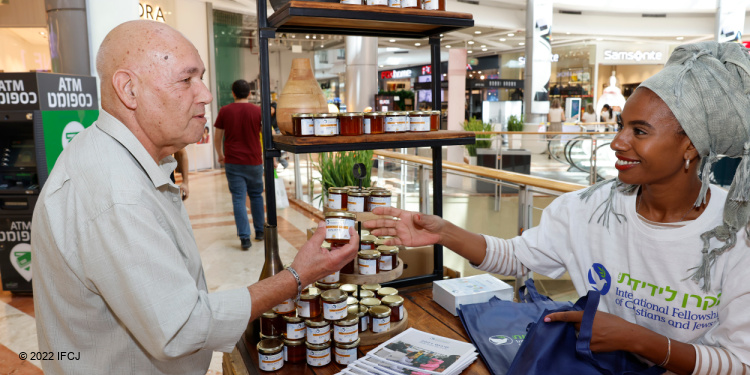A Sweet New Year to All
The Fellowship | September 23, 2022

Miriam Lock, a staff member in The Fellowship’s Jerusalem office, shares her reflections on the upcoming High Holy Days in Israel and what a sweet and holy time of year it is.
As summer wanes and the long, hot days become shorter, and the evenings and early mornings a little cooler, I begin thinking about the upcoming Jewish holidays. In the Jewish calendar, fall brings a cavalcade of holidays, beginning with Rosh Hashanah and Yom Kippur and the days between them (the High Holidays), continuing to the weeklong celebration of Sukkot (the Feast of Tabernacles), and ending with the one-day holiday of Simchat Torah (the Celebration of the Torah).
Rosh Hashanah is the Jewish New Year, a two-day holiday of prayer and reflection. During the morning services we say many special holiday prayers, and we blow the shofar, a ram’s horn, in the synagogue. The deep sound of the shofar is a call to Jews everywhere, reminding them that it is time to repent and start the year anew.
Rebooting Our Lives
When our computers are stuck, the first solution is often to “reboot” the computer. Just the act of closing the system and restarting can make all the difference. Rosh Hashanah is like “rebooting” our lives. On Rosh Hashanah, we pray to God to forgive us for any wrongdoings in the past year. The Ten Days of Repentance (another name for the High Holy Days) begin on Rosh Hashanah and culminate with Yom Kippur, a holy day of prayer and fasting. Each year, we have a golden opportunity to repent and “reboot.” It is a time to reflect on our lives and think about what we can do differently in the New Year. We can make changes, we can do better, we can face our own personal obstacles and move forward. Rosh Hashanah is the beginning of a new and better year.
In addition to prayer and repentance, Rosh Hashanah is also a joyful family celebration. We serve delicious holiday meals. One of the customs most identified with Rosh Hashanah is the dipping of a slice of apple into honey at the beginning of the holiday meal, symbolizing a sweet New Year. Jews around the world celebrate the New Year with this custom. We follow the custom with a special prayer: “May it be Your will to renew for us a good and sweet year.”
The Land of Milk and Honey
Honey, however, is not only for apples. Challah bread, served at the holiday meal before the apples, is dipped in honey first. Moreover, while we eat apples and honey only on Rosh Hashanah, we dip the challah into honey throughout the month until after the Sukkot and Simchat Torah holidays. Honey is prominent in other holiday dishes as well, such as honey cake or carrots cooked in honey. The sweetness of honey symbolizes a sweet year. Also, in the Bible, Israel is called the “Land of Milk and Honey.” Throughout many generations, honey has reminded Jews, wherever they lived in the world, of their historical homeland.
Many historians say that the honey referred to in the Bible was made from dates. But the honey consumed during the High Holy Days and throughout the year is made by bees. According to Israel’s Honey Marketing Board, there are about 120,000 beehives throughout Israel and more than 500 registered beekeepers. Israel consumes 4,500 tons of honey each year – an average of 600 grams of honey per person. Israel consumes most of this honey during the fall Jewish holidays in the Hebrew month of Tishrei. And, as you can imagine, honey sales in Israel are the highest during this time.
Sweetening the High Holy Days
In Israel, people often give jars of honey as gifts to wish friends and family a Happy New Year. We also sometimes give honey combined with other things, such as bottles of olive oil or wine. Buying honey produced in Israel is not only a way to sweeten your holiday and the holiday of others. It is a meaningful way to support Israeli agriculture and the Israeli economy.
This year, as we have in the past, The Fellowship is distributing jars of honey in various shopping malls throughout Israel as part of our “Honey and Fellowship” campaign. The purpose of the campaign is to encourage the shoppers stopping at The Fellowship’s booth to take a jar of honey and bring it to an elderly neighbor to sweeten their holiday. The honey, along with a New Year greeting from The Fellowship, is passed from the hands of the volunteer to the hands of the shopper and then to the hands of the elderly neighbor. Together, we are sending good wishes for a healthy and sweet New Year to everyone.
Miriam Lock
